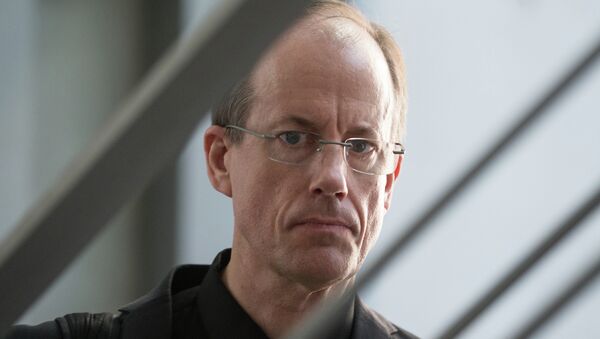US whistleblower Thomas Drake and University of Melbourne computer and information specialist, Dr Suelette Dreyfus, were shuttered from the high-level conference despite receiving invites to attend the event months ago, with officials later saying that their speeches were "incongruent" with CyberCon.
Mr Drake was to deliver a speech on surveillance and national security and Dr Dreyfus was set to speak on using digital drop boxes to assist in anti-corruption whistleblowing when CyberCon barred the two from attending.
We've just posted abstracts and slides for the talks @CyberGovAU didn't want #CyberCon to hear. @SueletteD's abstract: https://t.co/Bmpq2b4am2 @Thomas_Drake1's abstract: https://t.co/32dUnriN5S and slides: https://t.co/rRL9Tfu9nY pic.twitter.com/rH0ksrYOPO
— CensorCon (@censorcon) October 8, 2019
Mr Drake is a former National Security Agency (NSA) official who blew the whistle on the agencies surveillance policies in the mid-2000s. The NSA attempted to charge Mr Drake under the US Espionage Act 1917, the same bill used against Wikileaks founder Julian Assange, but later dropped the charges.
The whilstleblower was informed he was dropped from the programme moments after boarding his flight to Australia, adding that this was the first time he had been blocked from attending a conference after receiving an invitation.
He said: "Apparently, a partner of [Australian Information Security Association] did not want to have me, as a whistleblowing voice, on stage in front of the delegates.
Dr Dreyfus said that the conference had also not given notice until a week ago, stating that there was "now a culture of fear about speaking up".
"Nothing highlights this quite so much as disinviting speakers who have been confirmed," she added.
Did our ASD signals intelligence agency have two speakers banned from Australia’s CyberCon national cyber conference? https://t.co/41SaktzwpY
— Peter Cronau (@PeterCronau) October 8, 2019
According to Dr Dreyfus, the Australian Information Security Association (AISA), who organised the conference, said that one of its partners made the final decision. The event is also backed by the Government's Australian Cyber Security Centre (ACSC), the Australian Signals Directorate, and others.
The AISA's deputy chair, Alex Woerndle, said: "AISA supports and encourages diversity of views however it's important to note we work with a number [of] partners, including Government, and as such need to manage a variety of views to deliver an event catered for all our stakeholders.
Shadow Assistant Minister For Cybersecurity Outraged by Conference Decision
But Tim Watts, the Australian shadow assistant minister for cybersecurity, slammed the decision and demanded that the government explain "why it wants to silence speakers on whilstleblowing".
Mr Watts said: "If the Government has legitimate concerns over these individuals, then they should be upfront and explain themselves.
Whistleblowers were the "canary in the coal mine" of democracy, he added. "I find it hypocritical and ironic that I would be silenced at this conference," he said.
ABC news reporter Ariel Bogle also lambasted the move, stating that she had "yet to hear from the ACSC-ASD why Suelette Dreyfus and Thomas Drake were suddenly dropped from the CyberCon program".
There was "a lot of community concern here," she added.
— Ariel Bogle (@arielbogle) October 8, 2019
Dean of Melbourne University School of Engineering, Prof Mark Cassidy, said he was "disappointed" about the news that Dr Dreyfus had been disinvited".
"Now is the time for important and robust discussions about maintaining data security and protecting Australians," he said. "We welcome debate and will always support academic freedom."
— Melbourne School of Engineering (@engunimelb) October 8, 2019
Debates over press and media freedom have skyrocketed after Wikileaks founder Julian Assange was arrested at the Ecuadorian embassy in London on 11 April to avoid being extradited to the United States over alleged sexual assault charges in Sweden. The Australian journalist feared severe torture, punishment and potentially the death penalty for publishing cables on US war crimes in Iraq and Afghanistan in 2010, revealed by whistleblower Chelsea Manning, as well as former NSA contractor Edward Snowden, who released a trove of documents on the US and UK governments spying programmes, among many others, including releasing over 36,000 cables linked to corruption by former US presidential candidate Hillary Clinton.
Assange, who sought asylum in Ecuador, was slapped with 17 counts totalling up to 175 years in prison for his work with Wikileaks, with the US Department of Justice citing the Espionage Act 1917. The Wikileaks founder currently awaits further heraings at Belmarsh prison until 25 February 2020, where his health condition remains in fragile state due to psychological torture and years of solitary confinement.




